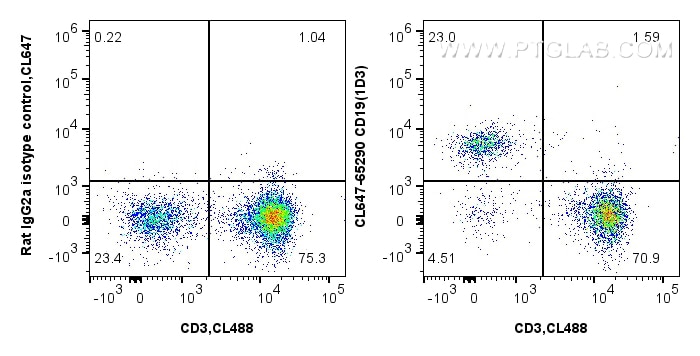Tested Applications
| Positive FC detected in | mouse splenocytes |
Recommended dilution
| Application | Dilution |
|---|---|
| Flow Cytometry (FC) | FC : 0.5 ug per 10^6 cells in 100 μl suspension |
| This reagent has been tested for flow cytometric analysis. It is recommended that this reagent should be titrated in each testing system to obtain optimal results. | |
| Sample-dependent, Check data in validation data gallery. | |
Product Information
CL647-65290 targets CD19 in FC applications and shows reactivity with Mouse samples.
| Tested Reactivity | Mouse |
| Host / Isotype | Rat / IgG2a, kappa |
| Class | Monoclonal |
| Type | Antibody |
| Immunogen |
Mouse CD19 Transfected Cell Line Predict reactive species |
| Full Name | CD19 antigen |
| GenBank Accession Number | BC156767 |
| Gene Symbol | Cd19 |
| Gene ID (NCBI) | 12478 |
| RRID | AB_3673577 |
| Conjugate | CoraLite® Plus 647 Fluorescent Dye |
| Excitation/Emission Maxima Wavelengths | 654 nm / 674 nm |
| Form | Liquid |
| Purification Method | Affinity purification |
| UNIPROT ID | P25918 |
| Storage Buffer | PBS with 0.09% sodium azide, pH 7.3. |
| Storage Conditions | Store at 2-8°C. Avoid exposure to light. Stable for one year after shipment. |
Background Information
CD19 is a 95 kDa type I transmembrane glycoprotein belonging to the immunoglobulin superfamily (PMID: 2472450). It is expressed by B cells and follicular dendritic cells. CD19 is up-regulated at the step of B-lineage commitment during the differentiation of the hematopoietic stem cell, it remains on during subsequent stages of differentiation until finally down-regulated during terminal differentiation into plasma cells (PMID: 8528044). CD19 is involved in B cell development, activation and differentiation. It is the dominant component for the signaling complex on B cells that includes CD21 (CR2), CD81 (TAPA-1) and CD225 and acts as a critical co-receptor for BCR signal transduction (PMID: 23210908).
Protocols
| Product Specific Protocols | |
|---|---|
| FC protocol for CL Plus 647 CD19 antibody CL647-65290 | Download protocol |
| Standard Protocols | |
|---|---|
| Click here to view our Standard Protocols |




